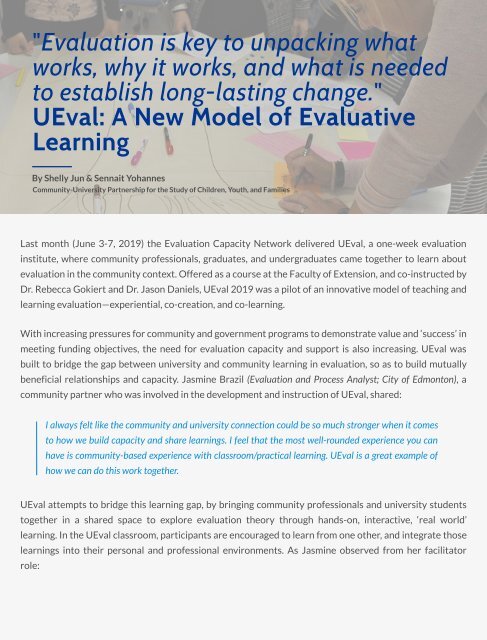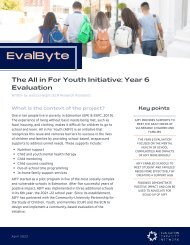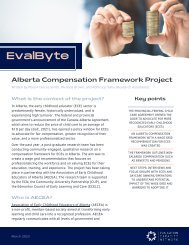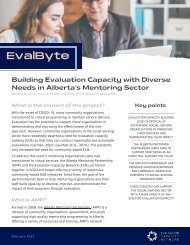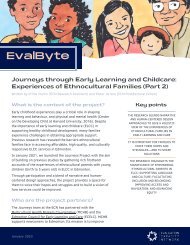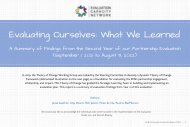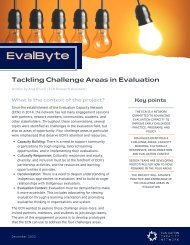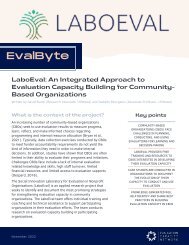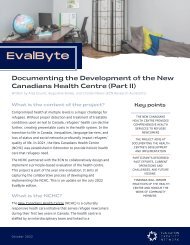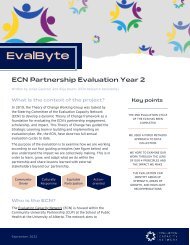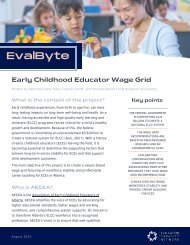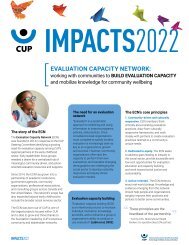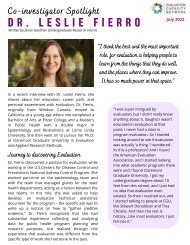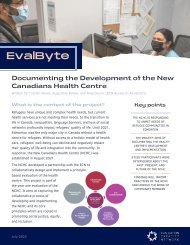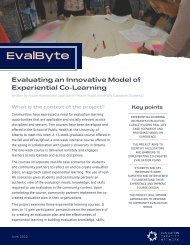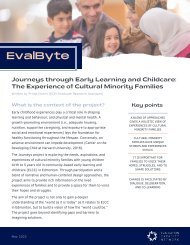UEval: A New Model of Evaluative Learning
- No tags were found...
You also want an ePaper? Increase the reach of your titles
YUMPU automatically turns print PDFs into web optimized ePapers that Google loves.
"Evaluation is key to unpacking what<br />
works, why it works, and what is needed<br />
to establish long-lasting change."<br />
<strong>UEval</strong>: A <strong>New</strong> <strong>Model</strong> <strong>of</strong> <strong>Evaluative</strong><br />
<strong>Learning</strong><br />
By Shelly Jun & Sennait Yohannes<br />
Community-University Partnership for the Study <strong>of</strong> Children, Youth, and Families<br />
Last month (June 3-7, 2019) the Evaluation Capacity Network delivered <strong>UEval</strong>, a one-week evaluation<br />
institute, where community pr<strong>of</strong>essionals, graduates, and undergraduates came together to learn about<br />
evaluation in the community context. Offered as a course at the Faculty <strong>of</strong> Extension, and co-instructed by<br />
Dr. Rebecca Gokiert and Dr. Jason Daniels, <strong>UEval</strong> 2019 was a pilot <strong>of</strong> an innovative model <strong>of</strong> teaching and<br />
learning evaluation—experiential, co-creation, and co-learning.<br />
With increasing pressures for community and government programs to demonstrate value and ‘success’ in<br />
meeting funding objectives, the need for evaluation capacity and support is also increasing. <strong>UEval</strong> was<br />
built to bridge the gap between university and community learning in evaluation, so as to build mutually<br />
beneficial relationships and capacity. Jasmine Brazil (Evaluation and Process Analyst; City <strong>of</strong> Edmonton), a<br />
community partner who was involved in the development and instruction <strong>of</strong> <strong>UEval</strong>, shared:<br />
I always felt like the community and university connection could be so much stronger when it comes<br />
to how we build capacity and share learnings. I feel that the most well-rounded experience you can<br />
have is community-based experience with classroom/practical learning. <strong>UEval</strong> is a great example <strong>of</strong><br />
how we can do this work together.<br />
<strong>UEval</strong> attempts to bridge this learning gap, by bringing community pr<strong>of</strong>essionals and university students<br />
together in a shared space to explore evaluation theory through hands-on, interactive, ‘real world’<br />
learning. In the <strong>UEval</strong> classroom, participants are encouraged to learn from one other, and integrate those<br />
learnings into their personal and pr<strong>of</strong>essional environments. As Jasmine observed from her facilitator<br />
role:
I noticed a lot <strong>of</strong> sharing, conversation and learnings happening between those that had community<br />
experience and those that had more graduate course experience. Everyone had the opportunity to<br />
lean on others within the course to expand their perspectives and learn more. Each person in the<br />
class or in the group work brought a different perspective, skills and experience to the table. While<br />
that means there are dynamics to navigate, I think it creates a great opportunity for engagement,<br />
creativity and learning.<br />
‘Real world’ learning was the opportunity for participants to<br />
put theory into practice by developing evaluative responses<br />
to local community-based initiatives. Ranging in topics<br />
related to early childhood, public washrooms, and care <strong>of</strong><br />
seniors, these initiatives were submitted as case studies by<br />
local community-based organizations, including: the City <strong>of</strong><br />
Edmonton, Fort Saskatchewan Families First Society, Early<br />
Childhood Coalitions <strong>of</strong> Alberta, Campus Food Bank, Brain<br />
Care Centre, Centre for Family Literacy, and Sage Seniors<br />
Association.<br />
With a total <strong>of</strong> 52 learners from across 7 faculties, 15<br />
disciplines, and 13 community organizations, each case<br />
study team was made up <strong>of</strong> mixed experiences and skills.<br />
Throughout the week <strong>of</strong> <strong>UEval</strong>, learners diligently worked<br />
in these mixed groups to create an evaluation framework<br />
for their assigned case study, developing stakeholder maps,<br />
logic models, data collection plans, and strategies for<br />
sharing evaluation results.<br />
Inspired by an innovative model <strong>of</strong> co-learning as observed<br />
at Pr<strong>of</strong>essor Javier Mignone’s Summer Institute at the<br />
University <strong>of</strong> Manitoba, <strong>UEval</strong> was designed to s<br />
similarly foster university and community engaged evaluative learning. A <strong>Learning</strong> Advisory Committee<br />
was brought together to plan the course delivery and curriculum, with members representing 6 university<br />
departments/faculties and 4 community organizations. Using a collaborative community-university<br />
engaged process for course development ensured that the curriculum would be relevant across different<br />
disciplines and sectors.
The <strong>Learning</strong><br />
Advisory<br />
Committee<br />
<strong>UEval</strong>, funded by the University<br />
<strong>of</strong> Alberta’s Teaching and<br />
<strong>Learning</strong> Enhancement Fund, is a<br />
collaborative effort between<br />
students and academics across<br />
disciplines at the University <strong>of</strong><br />
Alberta and local community<br />
stakeholders. Representation on<br />
this committee highlights the<br />
role <strong>of</strong> community in co-defining<br />
the evaluation process with the<br />
academy, and included:<br />
Faculty <strong>of</strong> Extension<br />
Department <strong>of</strong> Educational<br />
Psychology, Faculty <strong>of</strong> Education<br />
School <strong>of</strong> Public Health<br />
Faculty <strong>of</strong> Pharmacy and<br />
Pharmaceutical Sciences<br />
Community Service-<strong>Learning</strong>,<br />
Faculty <strong>of</strong> Arts<br />
Department <strong>of</strong> Human Ecology,<br />
Faculty <strong>of</strong> ALES<br />
City <strong>of</strong> Edmonton<br />
United Way <strong>of</strong> the Alberta Capital<br />
Region<br />
Edmonton Community Foundation<br />
Canadian Evaluation Society<br />
"I really appreciated the Faculty <strong>of</strong> Extension’s approach, to<br />
cater to the variety <strong>of</strong> disciplines with different levels <strong>of</strong><br />
exposure to evaluation concepts by including an interactive<br />
online module. I thought it worked well as a baseline<br />
introduction and refresher depending on the audience. This<br />
created somewhat <strong>of</strong> a level "playing field" for the practical<br />
in-class work, which I thought was fantastic!” (<strong>UEval</strong><br />
Student)<br />
The course was launched with a public lecture by<br />
evaluation expert Mark Cabaj (www.here2there.ca) on<br />
June 3, titled “Evaluating Complex Community-Based<br />
Initiatives: Emerging Practices”. Tackling complex<br />
systems interventions, Mark shared his experience on<br />
emerging practices for three challenges related to<br />
evaluating complex community-based initiatives.<br />
Reflections from Mark’s lecture resurfaced throughout<br />
the week during in-class discussions, and an<br />
appreciation for the complexity <strong>of</strong> community-based<br />
initiatives was evident among <strong>UEval</strong> learners. To access<br />
resources from the public lecture, visit our events page.<br />
Although classroom sessions have formally ended,<br />
conversations will continue as community learners seek<br />
out <strong>UEval</strong> peers to now provide further capacity, fill<br />
existing gaps, and co-create initiatives and evaluations.<br />
“Ultimately, I think the more prepared students and<br />
community learners are around the concepts and<br />
importance <strong>of</strong> evaluation - the stronger we are going to be as<br />
a community. We will be better able to address community<br />
needs, identify gaps and challenges, and partner to meet<br />
those needs. That's really what we are in this for right?<br />
Making people's lives better.” (Jasmine Brazil)<br />
Our learnings from the <strong>UEval</strong> pilot will support the refinement <strong>of</strong> this new model <strong>of</strong> experiential, cocreated,<br />
and co-learning in evaluation education.<br />
Interested in <strong>UEval</strong> 2020?<br />
Stay connected by joining our network! (https://forms.gle/bHmpVtNzTaPwL95SA)


